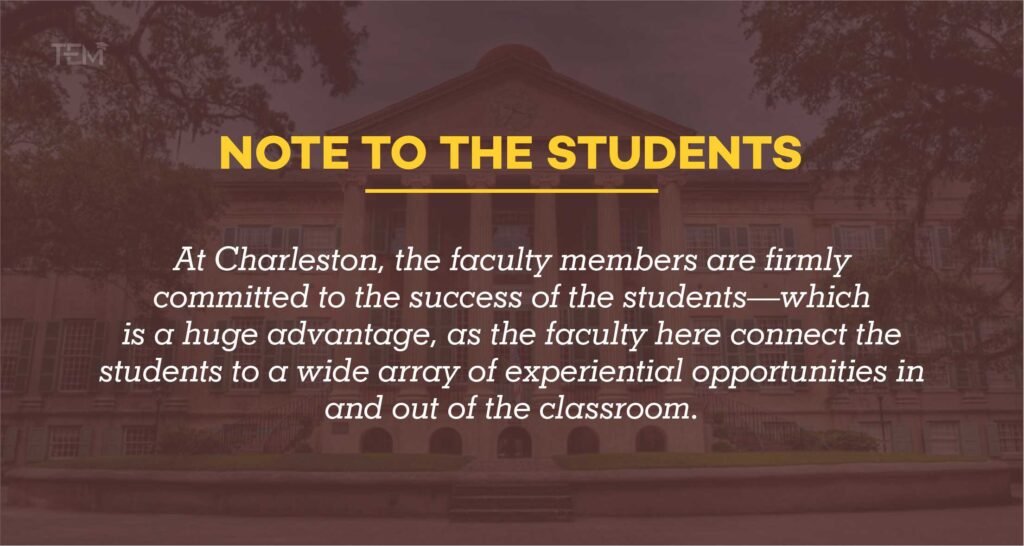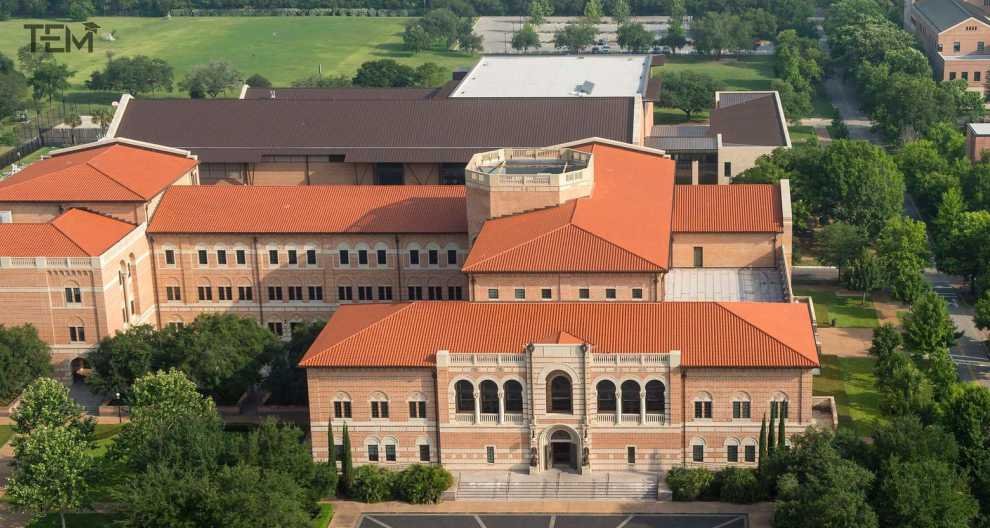Located in the heart of the historic city of Charleston, South Carolina, the College of Charleston is a nationally recognized, public liberal arts and sciences university. Founded in 1770, and chartered in 1785, it is among the nation’s top universities for quality education, student life, and affordability. The College of Charleston is also the 13th oldest institution in the United States. It’s beautiful and historic campus, combined with contemporary facilities and cutting-edge programs, attracts students from across the world.
Engraved Values of Sustainability
Since its inception, the College of Charleston has served as a thought leader for the Southeastern region. The institution has strived to serve as a public university grounded in the principles of the liberal arts, committed to developing ethically centered, intellectually versatile, and globally fluent citizens—who create innovative solutions to social, economic, and environmental challenges.
The academic and administrative leaders of the institution are dedicated to instilling the values of the prestigious institution into the students. The campus-wide quality enhancement plan (QEP) is named “Sustainability Literacy – a Bridge for Addressing 21st Century Problems.” The overarching goal of the QEP is to imbue students with the knowledge that will enable them to become sustainably literate individuals while equipping them with the skills to develop solutions that address the ramifications of climate change.
The College established The Centre of Sustainable Development (CSD) with a commitment to sustainable operations and literacy as a framework for addressing the issues of the 21st century. Collectively, the CSD focuses on applied research, experiential learning, operational management, and public engagement—on campus and in the surrounding community.
Helming Sustainable Development
Darcy Everett serves as the climate coordinator and zero-waste manager at the CSD. She is an experienced sustainability professional with a history of working at higher education institutions including the University of North Carolina at Charlotte. Alongside, she has also worked on sustainability, waste reduction, and recycling within several municipalities. Darcy is skilled in sustainability programs, project development, data management, reporting, and stakeholder engagement. She joined the College in 2019.
Presently, Darcy leads a number of campus initiatives at the College, including ‘Move-Out,’ which is a bi-annual effort to repurpose, recycle and reduce discarded items that students leave behind when they move out of the residence halls at the end of the fall and spring semesters.
“I love the opportunity to incorporate my passion for sustainability into our day-to-day work—I always look for ways to make positive personal changes that others can emulate,” says Darcy.
Dedicated Initiatives
In addition to its curricular and co-curricular focus on sustainability, the College of Charleston has been seeking Leadership in Energy and Environmental Design (LEED) ratings. The institute always seeks ratings for new or renovated buildings. Further, it has implemented a campus-wide zero-waste initiative, composting of the waste generated from the dining halls, and pursuing a campus-wide recycling program. Other initiatives include transitioning to electric-powered vehicles and incorporating sustainable practices in the institution’s procurement processes.
Cougar Change Makers
Numerous students enroll at the College of Charleston with the purpose of changing the world. The College offers numerous opportunities for them to get engaged with campus-wide sustainable practices. Along with that, it also celebrates the students’ efforts to address the issues of social, environmental, and economic justice.
The Cougar Changemaker Program aims to encourage and empower the campus community to create and implement innovative sustainable projects through an accessible and adaptable change-making framework. The “Cougars” (students) can present their innovative ideas on various themes, including climate change, economic/financial sustainability, research or experimental projects, sustainable procurement, transportation, campus infrastructure, and many more.
“We invite students to get involved—the students at the College are the Center of Sustainable Development’s greatest resource,” says Darcy.
Inspiring Student Engagement
The College of Charleston’s Sustainability Literacy Institute has been orchestrating various events to inspirestudents. It has also held virtual and in-person events with speakers like Maude Barlow and Winona LaDuke on the gripping environmental issues of the modern world. Over the past year, this body staged a series of panel discussions—titled Climate Fridays—which featured various climate experts from the faculty and the local community. In addition, the College of Charleston created Earth Month (in April)—where a variety of awareness-generating events including talks, panel discussions, interactive gatherings, films, and art exhibitions were held.
Enhanced Academic Propositions
The College of Charleston offers over 80 minors and 63 different major fields of study. It has over 9,000 undergraduate students and around 1,000 graduate students with a student to faculty ratio of 14.5:1.
Due to the focus of the QEP on sustainability literacy, faculty members at the College have developed a series of sustainability-focused and sustainability-related courses over the past four years. This list of special courses has continuously been increasing each year.
In addition, the College offers four different undergraduate certificates, including one focused on Sustainability and 21st Century Business Solutions.
The College of Charleston has several programs designed for non-traditional students, including the ‘Bachelor of Professional Studies.’ Further, the Center for Continuing and Professional Education provides non-credit courses, certificates, executive education, and other opportunities for non-degree-seeking students in the region. The experienced admissions team at the institute seeks prospects who value the opportunity to work closely with the professors in a one-on-one basis.
Reacting responsibly to the Pandemic
When the global pandemic hit, the College of Charleston had to respond quickly to ensure the safety of everyone on and off-campus. Initially, the institution switched to online virtual classes for a period of one week. Subsequently, the administration opted to permanently switch to the online mode of instruction for the remainder of the spring session in 2020.
Since then, the College has implemented a hybrid solution with some courses taking place in person, some online, and some using a combination of the two methodologies. Additionally, the College set aside an entire residence hall for quarantine purposes. In the dining halls, self-service was discontinued and diners were served individually to maintain proper COVID-19 safety protocols.
Noteworthy Student Scholarship Programs
The College of Charleston offers a wide array of scholarship programs. As a state institution, the College offers South Carolina state scholarships, including the Palmetto Fellows and LIFE Scholarships. It also has multiple institutional scholarships for first-year students, like the National Merit Scholarship and the Colonial Scholarship. In addition, the College of Charleston offers departmental scholarships and specialty scholarships including the Alumni Association Scholarship.
The College’s Career Center employs 10 full-time staff members. It has also been rated No. 1 by the Princeton Review among universities in the U.S. that offer master’s degree programs. The staff in this office offers résumé reviews, interview training, and career counseling. In addition, they post over 1,700 jobs each month, bring over 100 recruiters to campus each semester, and post more than 450 internship opportunities every month. As a result, over 90% of students complete an experiential learning experience each year, and over 81% of the most recent graduating class were employed full-time within a year of graduation.

Read Full Magazine:- The 10 Revolutionary Green Schools, 2021.


